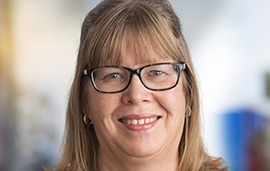CASE – a collaborative work process for better research project support
Investing in a new case management system led to so much more than just better technical functionality. Susanne Jarl, administrator at the Research Support Office, shares how the need for a tailor-made IT solution ended up in new collaborations and co-creation with more efficient administrative processes for researchers at KTH.
The old system had its limitations but with dedicated resources and directives from Annika Stensson Trigell, vice president for Research, a project group set out with a broad approach to design something better. The group included staff from the IT department, from all school administrative functions, registrars, lawyers and administrators and research officers at RSO.
All involved can access a case and forward the process

"As a side project to CASE, the role of contract coordinators at the schools took form and that led to using CASE not only as a tool but as a joint platform where all involved could see and understand all the steps of the administrative process," explains Susanne Jarl.
"The school administrators can open a case in the system and gather all materials there from the start. This can be in the application phase but also later in the process. The school's contract coordinators are a link between the schools and RSO and forward cases to the lawyers when they need reviewing. At this point, a lot of the documentation is already available in the system, which saves time. When the lawyers are finished, they change the case status and an email is sent automatically to the contract coordinator and research officer at RSO. CASE also allows users to enter reminders or notifications related to a specific case, for example to get a notice when a contract is fully signed and completed."
Positive and broad collaboration between schools and GVS
"Within our RSO team, we have developed a processing routine that we can hand out to e.g. new employees. We have shared it with the schools and their group of contract coordinators are now working on a joint document that describes their routines. Thanks to the collaborations in developing CASE, we have come closer to the motto working as one KTH," she says.
"The feedback we have received is that CASE creates order and clarity. The schools get a better overview of the applications and projects handled by the administrative support. The first school started to use the system in March 2020. It was only them, when we started working with real data in CASE that we could really see how it worked."
Next step for CASE
"I think the system will never be completely finished and if we had waited until we had a perfect system, then we would not have started yet. We are learning by doing. This is actually one of the success factors, at least according to us in the management group, consisting of Niklas Olsson at the IT department and expert on the system's features, Maria Gustafson, head of department at RSO and system owner, and myself as the administrative manager," says Susanne.
"After working with CASE for some time now, we know what we want to develop further. As of July this year, we have been running a pilot with the registration of research related information involving RSO and the ITM school. The objective is to avoid handling the same files twice in both CASE and the W3D3 system."
"We hope that other schools will follow suit and that we can all work with better processes. Eventually, the data in CASE will end up in an e-archive, but this is a more long-term goal and a matter for the registrars and the IT department, not me or RSO", concludes Susanne Jarl.
